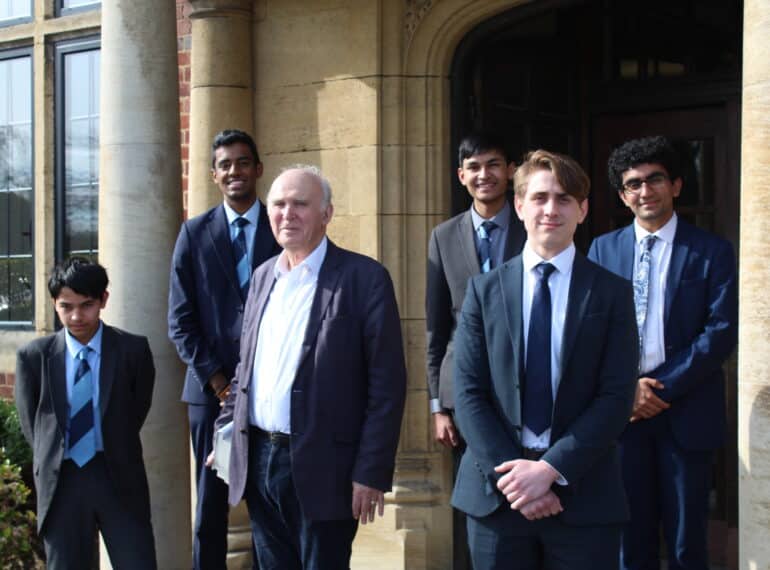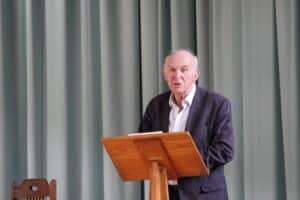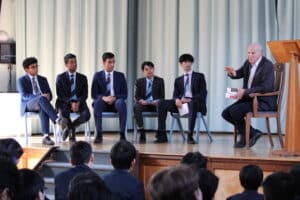Toughing it out: Sir Vince Cable spells out need for resilience on visit to QE

Former Liberal Democrat leader Sir Vince Cable first came to QE in 2016, a few months after losing his Twickenham parliamentary seat and more than a year before he won it back in the 2017 General Election.
Appropriately, then, during a lecture on his second visit, he urged on the boys the need for stamina and resilience.
His lecture came at the invitation of the School’s Politics Society. He duly gave afficionados of British Politics plenty to ponder on, giving his assessment of the likely result of the forthcoming General Election, while addressing the “more interesting questions” about what happens afterwards.
Headmaster Neil Enright said: “Sir Vince is a substantial figure in the British political scene, with a lifetime of experience to draw upon. We are grateful to him for visiting and sharing with the boys his valuable insights and advice.
“He stayed to answer further questions after the end of the formal session and was candid in his views with students. He was also generous with his time, and kindly donated a copy of his book, How to be a Politician, to The Queen’s Library.”
Earlier in the year, the Politics Society welcomed Labour’s prospective parliamentary candidate for Chipping Barnet, Dan Tomlinson, and it has previously hosted Theresa Villiers MP, who has held Chipping Barnet for the Conservatives since 2005.
Sir Vince announced his intention to retire from front-line politicis in 2019 and stood down at that year’s General Election. In July 2022, he was announced as Vice President of the European Movement.
 His afternoon visit to QE was led by the society’s Rishabh Bhatt, of Year 12. Before taking questions from an audience drawn from all year groups in the Main School Hall, he gave some brief advice to any aspiring politicians. They should understand the importance of:
His afternoon visit to QE was led by the society’s Rishabh Bhatt, of Year 12. Before taking questions from an audience drawn from all year groups in the Main School Hall, he gave some brief advice to any aspiring politicians. They should understand the importance of:
- Being a good communicator – across all channels, including broadcasting and social media, yet without neglecting the skills required for speaking to people in person on the ground;
- Building a team – recognising that even though the focus can often be on individuals, politics is ultimately a team game, so one needs to build a team and work cooperatively with others to get things done;
- Developing persistence and resilience, cognisant of the fact that any politician is likely to face many setbacks.
With regard to the final point, he recalled that it took five attempts at running for Parliament before he first became an MP: he eventually won his Twickenham seat in 1997. His two-year hiatus from Parliament began as a result of the near-wipeout of the Lib Dems in 2015, yet after he won his seat back, he went on to become his party’s leader, serving for two years before retiring from front-line politics.
He also gave the example of Yvette Cooper, likely to be the next Home Secretary if Labour win the forthcoming General Election. Although she has always retained her own seat, she has seen her party lose four elections since she was last in the Cabinet from 2008–2010 under Gordon Brown’s premiership.
He noted that the UK’s first-past-the-post (FPTP) electoral system is very significant and makes life difficult for smaller parties to break through, with only two parties ever really being in contention. The Lib Dems were aiming to get back to being the third party in the Commons, with the opportunities that presents, such as being able to ask regular questions at PMQs. But, he said, this will depend on what happens in Scotland with the SNP.
 Assessing how the General Election may go overall, he said that a Labour government seems the most likely at present, but that it was entirely possible that it would not have the big majority that some, taking their cue from opinion polls, are assuming.
Assessing how the General Election may go overall, he said that a Labour government seems the most likely at present, but that it was entirely possible that it would not have the big majority that some, taking their cue from opinion polls, are assuming.
He focused on two questions relating to the election’s aftermath. Firstly, what would become of the Conservative Party if it did suffer the predicted heavy defeat. Would the Conservatives move to the populist right, closer to, or perhaps merging with, Reform UK? Would they attempt to position themselves as moderates in the centre-right – more like PM David Cameron’s coalition in which he served as Business Secretary? Or could the Conservative Party even cease to exist as an election-winning force – declining like the Liberal Party in the 1920s?
Secondly, he wondered, what would Labour actually do in power? They would face a difficult economic situation and the same long-term challenges as the current government, he pointed out, and it was unclear as yet as to how they would respond.
Sir Vince answered questions focussing on his career. These included: his move from Labour to what became the Liberal Democrats alongside the Gang of Four (a group of leading politicians who broke away from Labour in 1981); the 2010–2015 Conservative-Lib Dem Coalition (“a good, stable government… good for the country, but bad for the [Liberal Democrat] party”); the role of tactical voting in the next General Election (“always important”); the prospects in that election for the Lib Dems – they were targeting a return to 30-35 seats, he said; and the sale of Royal Mail when he was Business Secretary (it was necessary and not a bad deal at the time, he said, given that people now communicate electronically, not by letter, so the business model had to change in any case).
